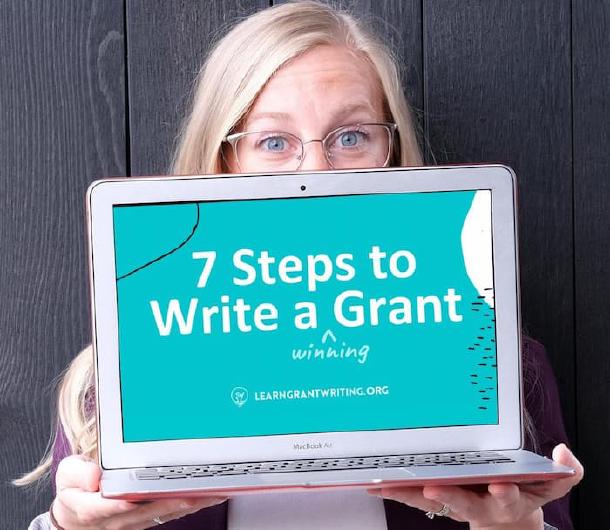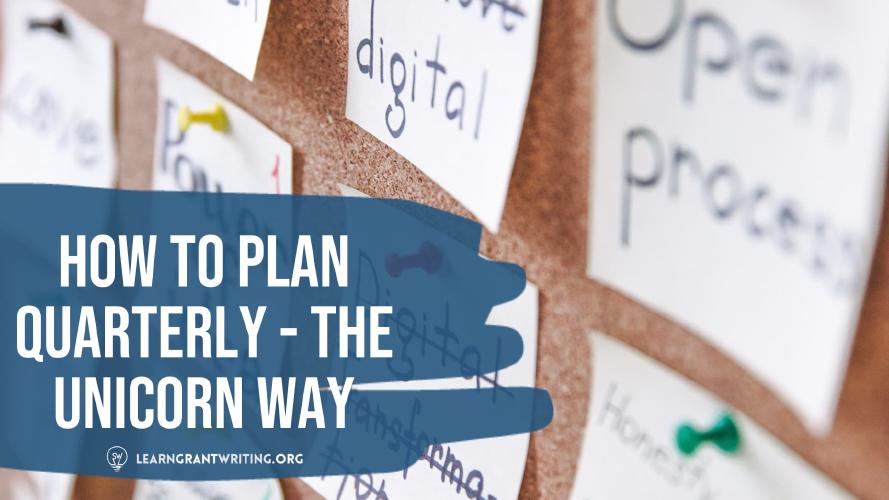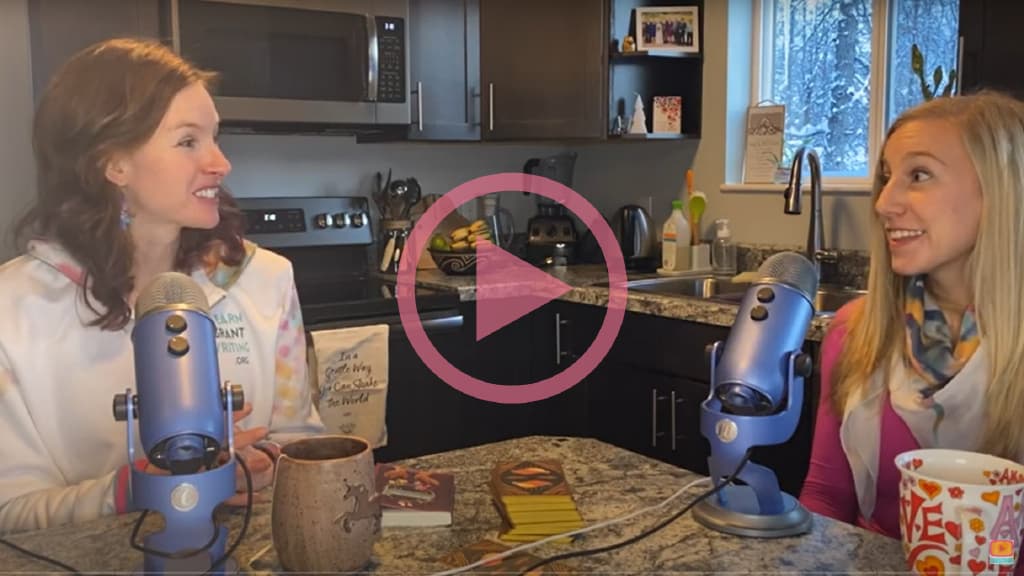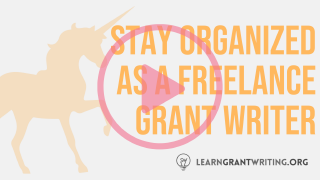Are you making progress on your 2022 goals? Are you where you thought you’d be by this time of the year?
We’re heading into quarter two soon (April - June), and if you’re like most people, you’re already feeling behind on something you wanted to do. Maybe your boss at your 9-5 dropped a big project on you that’s taking all your time and energy. Perhaps post-holiday family drama is eating up your energy, even well after Valentine’s Day. Or maybe the kids have been home from school for one too many snow/covid-19 days and disrupted your plans.
Grant writers know well that good planning is not only needed, it’s essential. How we plan in our own lives often leaves us feeling overwhelmed from the start and defeated once real life happens. Spoiler alert: it always does.
Alex knows just what this feels like. “I used to work at this job where I had a million tasks,” she said. “It always felt like I was that person who just responded to emails and let that dictate what I spent my time on. I would have this everlasting sticky note of tasks. So even if I checked off ten of those tasks, I felt unproductive and incomplete because I had thirty on the list. When you pick three things to focus on in a day, you can finish them. If you can’t get all three, you can usually get two, and two out of three is a way better feeling than ten out of thirty!”
Meredith and Alex want to walk you through the transformational planning framework they use throughout the year to plan for success and achieve it. Let’s dive in!
Listening or Watching More Up Your Alley?
Listen to the podcast episode here:
Or, head on over to this video to watch the conversation unfold: Step Away From the Stress and Set Up 2022 the Unicorn Way...Through Quarterly Planning! 🦄 📆
Why Do You Plan?
Plan your quarterly calendar for success. Success doesn’t have to just mean bottom-line, revenue, or profit. Whatever success looks like it to you, research shows that planning for it increases your follow-through and the likelihood of achievement. Planning is “the way out of acting like everything is on fire all of the time,” Alex said.
“One of the things that calms my nervous system when I’m stressed and not sleeping well is just making a plan,” Meredith added.
Set Your Intention
Setting an intention is much more than a goal, and it’s much more than woo-woo jargon. It’s a mindfulness tool to develop your goals and reflect on as the quarter progresses. An intention focuses you on what matters most in your life. Use it as a starting point to get granular with your time so that you can attain your big picture objectives.
Meredith and Alex start their quarterly planning session with the question, “How do you want to feel at the end of next quarter?”
This intention (or one like it) moves the focus from quantitative objectives (“I want 12,000 Instagram followers”) to qualitative objectives (“I want more rest in my weekdays”). Unicorns live robust lives: outdoors, travel, service, relationships, and leisure are all priorities to folks inside our Collective. It’s important that our goals reflect that. Setting an intention allows space for thinking holistically about your life and what you want to achieve in it. As Seneca, philosopher and playwright, said, “Life is long if you know how to live it.”
At the end of quarter one, “I want to feel so accomplished and know there’s no huge laundry list of things we need to do. That we’ve hit a major milestone in rolling out [The Global Grant Writers Collective updates]. I know I will get a huge amount of satisfaction from that—knowing we’ve done everything in our power to make that the most amazing transformative experience in our power," Meredith said. “I want to do all that while taking time to ski, be outside, and know that we are not killing ourselves. Let’s finish the quarter really clean so that [Alex] and I are energized.”
Alex added, “When I thought about this question, it was that our members and our Collective feel so supported. That makes me feel supported, energized, and excited,” for the next quarter.
How Healthy Is Your Consulting Business?
Take our 4 minute consulting business test to quickly diagnose your sticking points and get you moving, with more joy and ease.
Take The Test
The Big 3 Framework
The Big 3 Framework for goal planning is not original to Meredith and Alex. They learned it from their mentor and coach and have added some Unicorn-flavor to it over the last year and a half. By consistently implementing this formula for planning, and modifying it as needed (since Unicorns are adaptable), they consistently achieve success without losing themselves in the process.
“Too often we take whatever our inbox sends our way and go with that as our priority, and not the priorities we are setting,” Meredith said.
In the Big 3 Framework, you set three goals for a year, three for each quarter, and three for each week. These three goals are ideally one new idea and two maintenance projects. However, entrepreneurial frontierswomen, Alex and Meredith, sometimes have trouble sticking to this formula themselves.
“We are chronically over ambitious,” Alex said. “We often have two new ideas, and one maintenance project (which is hardly just a maintenance project),” Meredith added. “We really encourage you to stick to the one new idea, two maintenance projects formula as it’s a much more sustainable cadence.”
Importance of Work Life Balance
Start by setting your year’s Big 3 rocks. Setting your goals can happen at any time of the year, so don’t worry about it not being anywhere near December or January. In fact, Meredith and Alex do their yearly planning in July. This way they avoid the added stress and activity at the end of the year. They can go into a period of rest knowing they have already set their Big 3 goals for the next year and enjoy time off. They enter the new year refreshed and ready to implement their quarter one goals.
All your planning needs to zoom up to one question. For Meredith and Alex this question is, “Does this activity help me meet the goal I’ve set?” The Big 3 Framework is a decision-making framework to decide if each activity and opportunity that comes your way in a week, quarter, or year are a good use of your time.
It’s not the Big “30 Rocks”
“The problem we often see with goal setting is that people are too ambitious,” Meredith said. “When you have Big 5 goals, you can’t do it. The context switching is too high. You get to the end of the quarter and you haven’t gotten anything done and you feel bad.”
To decide on what three rocks you want to pursue, Meredith and Alex recommend the pen and paper approach first. Write them all down. Look at what you’ve written and consider when they fit best into your year, how they align with your priorities, and which things may be nice but not necessary.
“Sometimes these ideas feed into each other and become more consolidated in the Big 3. Then we pick the three rocks that matter the most and feed directly to our annual goals,” Alex said. Be aware that this step is hard! Meredith and Alex often spend a few days debating what the three rocks should be. This requires letting go of other goals they want to complete and either parking for another quarter or releasing entirely from their ambitions. Less truly is more.
Free Grant Budget Template
If preparing a grant budget scares you, those days are about to be over! Download the free grant budget template below and take our free grant writing class to learn how to use it.
Free Template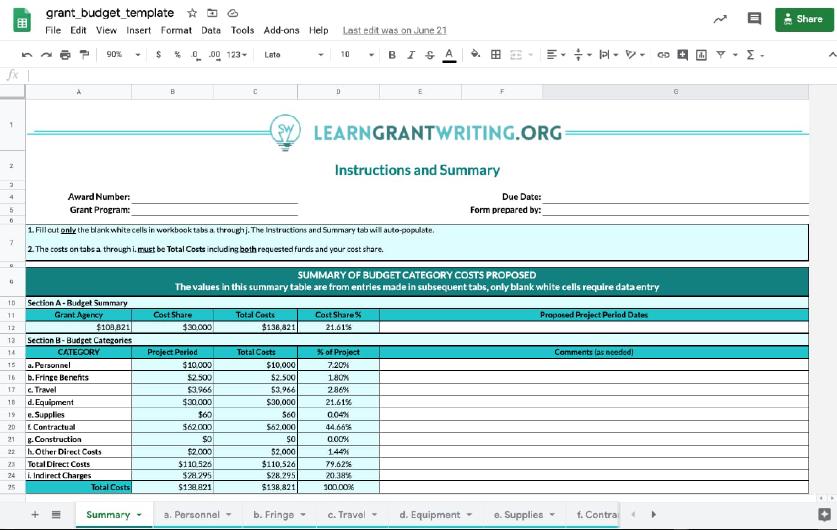
Set your Quarterly Rocks
Yearly goals are necessary but sometimes they are so big you can’t connect your day-to-day actions and routine to them. Quarterly goals give you a roadmap for three straight months so that you can minimize the need to constantly respond to your inbox, slack, and messages.
“Quarterly goals allow you to stay focused on where you want to be at the end of the quarter, and on pace for where we want to be by year end,” Alex said. “I don’t want to be running around like a chicken with my head cut off. It’s exhausting and draining.”
Exhausting and draining are not values of a Unicorn!
Once the Big 3 Rocks are in place for the quarter, it’s time to get super practical. With the appointments and commitments in place, we can plan the specifics of what is needed to do. “This year Meredith bought a beautiful calendar, and we write our Big 3 on sticky notes and we go week by week,” Alex said.
“Ideally, you will have three goals for each week,” Alex said. Weekly planning “is where the rubber meets the road to really negotiate and talk about where things go,” Meredith added. You need to consider whether you have allowed enough time for something, negotiate the priority level and energy required, and plan in your rest.
After this paper planning is done, it’s time to apply some project management magic to these plans. Meredith and Alex drill down on the plans and use their favorite project management tool, Asana, to develop tasks for each week, schedule due dates, and assign them to the appropriate team members.
Want to learn how Meredith and Alex use Asana? Check out this video to organize your day, week, and quarter.
These assigned tasks then become the Daily 3 of a team member. Each day everyone knows exactly what three tasks they need to focus on for the day. Yes, even before checking their phone, email, or Slack! This energetic team of three full-time employees and about 12 part-timers is moving fast toward their goals by using the Big 3 Framework for planning.
Let’s look behind the curtain and show you what this looks like for Meredith and Alex, in quarter one of 2022.
Rock 1: Grant Writing Cohorts
Meredith and Alex refreshed the original grant writing course, Grant Writing: From Start to Funded. They aligned with organizations they are passionate about to bring grant writing technical training to these audiences through customized, enterprise cohort models. Doing this allowed them to relaunch the original grant writing program, Grant Writing: From Start to Funded, on National Unicorn Day for folks who want stellar grant writing training at a lower price point than the Collective.
Rock 2: Training for Advanced Grant Writers in the Collective
The Collective includes an online course, community, and coaching calls. Phases 1 – 4 of the online course shows you how to get paid as a grant writer so you can build a portfolio of experience. Phase two is all about grant research and finding the right grants to pursue. Phase three is where you learn the 7-steps to writing winning grants. Phase four teaches how to hit $15,000 in revenue. By that point, you will know if you want to land a job as a grant writer or go the freelance grant writing route. Phase five is all about growing to $50,000 in revenue or landing a salaried job. On the agenda for this quarter is scripting, filming and editing Phase 6 for those building their business to 6-figures of annual revenue.
Rock 3: Community Development
This one is, theoretically, the maintenance project. The Unicorn Grant Writing Collective transitioned from Facebook to a new, clean, user-friendly platform called Circle. Circle allows Meredith and Alex to separate out their audience alongside allowing for more customization and personalization of the experience of students. It’s simply gorgeous compared to other online community platforms.
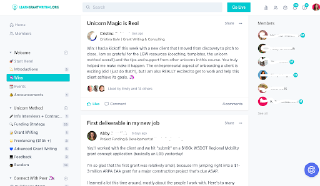
You can see that a whole lot can be packed into each rock! Yet, with all these goals in place, there’s still time for family, camping, and real-life when you use the Big 3 Framework. A full life is the Unicorn way!
How to Plan Quarterly - The Unicorn Method
To recap how to plan quarterly, follow this high-level overview:
- Set your big-picture vision for the year. Set an intention by asking yourself: “How do I want to feel at the end of next quarter?”
- Identify your Big Three Quarterly Rocks. What one new project and two maintenance projects will get you closer to achieving the three goals you set out to meet this year?
- Ask yourself, “Does every activity you’re pursuing lead you closer to your three quarterly goals?” when planning when the work will get done on the calendar.
- Define your Daily Three Rocks. What are the three most important (not the most urgent) things you need to do today to move toward your weekly goal?
Set an appointment with yourself and try using this tool in your life or business for the next three months, and let us know how it goes! “Just plan a quarter and don’t overwhelm yourself,” Meredith encouraged.
Grant Writing Resources
If you’re looking for meaningful work without sacrificing your meaningful life, check out our FREE Class on Writing Grantsto decide if grant writing is your next right step!
More questions? Shoot us a DM on Instagram!🦄
Free Grant Writing Class
Learn the 7-steps to write a winning grant application and amplify the impact you have on your community.
Access Free Class